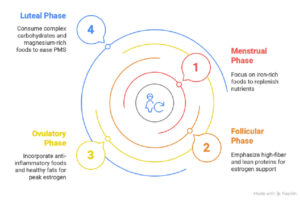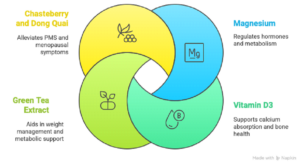As we observe National Women’s Health Week from May 11–17, 2025, it’s an opportune moment to focus on women’s health across all life stages. Weight management is a common concern, especially during periods of hormonal fluctuation such as the menstrual cycle and menopause. Understanding how to adapt nutrition, exercise, and lifestyle habits can empower women to maintain optimal health.
Understanding Hormonal Changes and Their Impact on Weight
Menopause and Weight Gain
Menopause, typically occurring between ages 45 and 55, involves a decline in estrogen and progesterone levels. This hormonal shift can lead to symptoms like hot flashes, mood changes, and weight gain, particularly around the abdomen. Factors contributing to weight gain include hormonal changes, decreased muscle mass, and lifestyle alterations. Addressing these factors through diet, exercise, stress management, and social support is crucial for managing symptoms.
Cycle Syncing: Aligning with Your Menstrual Phases
Cycle syncing involves adjusting diet, exercise, and lifestyle habits according to the menstrual cycle’s phases to support hormonal balance and well-being. While scientific evidence is limited, many women find that tailoring their routines to their cycle phases helps manage symptoms and optimize energy levels.
Optimal Nutrition for Hormonal Balance
Menopause-Friendly Eating
A whole-food diet rich in fruits, vegetables, whole grains, high-quality protein, and dairy products may reduce menopause symptoms. Consuming phytoestrogens and healthy fats, such as omega-3 fatty acids from fish, may also help.
Cycle Syncing Nutrition
Adjusting dietary intake to align with menstrual cycle phases can support hormonal balance:
Nutritional Strategies for Menstrual Cycle Phases

Supplements Supporting Hormonal Health
Certain supplements can aid in managing hormonal fluctuations and associated symptoms:
Holistic Health Benefits

Sleep and Stress Management
Quality sleep is crucial for hormonal balance. Aim for at least 7 hours of high-quality sleep per night. Establishing a consistent sleep schedule and creating a restful environment can improve sleep quality.
Managing stress through mindfulness, exercise, and relaxation techniques can also support hormonal health and weight management.
Emerging Wellness Trends
Innovative health spa services are redefining women’s wellness. These services aim to provide comprehensive support for women at various life stages:
⦁ Hormone Therapy Programs: Personalized treatments to address hormonal imbalances.
⦁ Nutritional Counseling: Tailored dietary plans to support hormonal health.
⦁ Fitness Programs: Exercise routines aligned with hormonal cycles.
By understanding and adapting to hormonal changes through nutrition, supplementation, sleep, stress management, and embracing innovative wellness services, women can effectively manage weight and enhance overall well-being throughout their lives.


